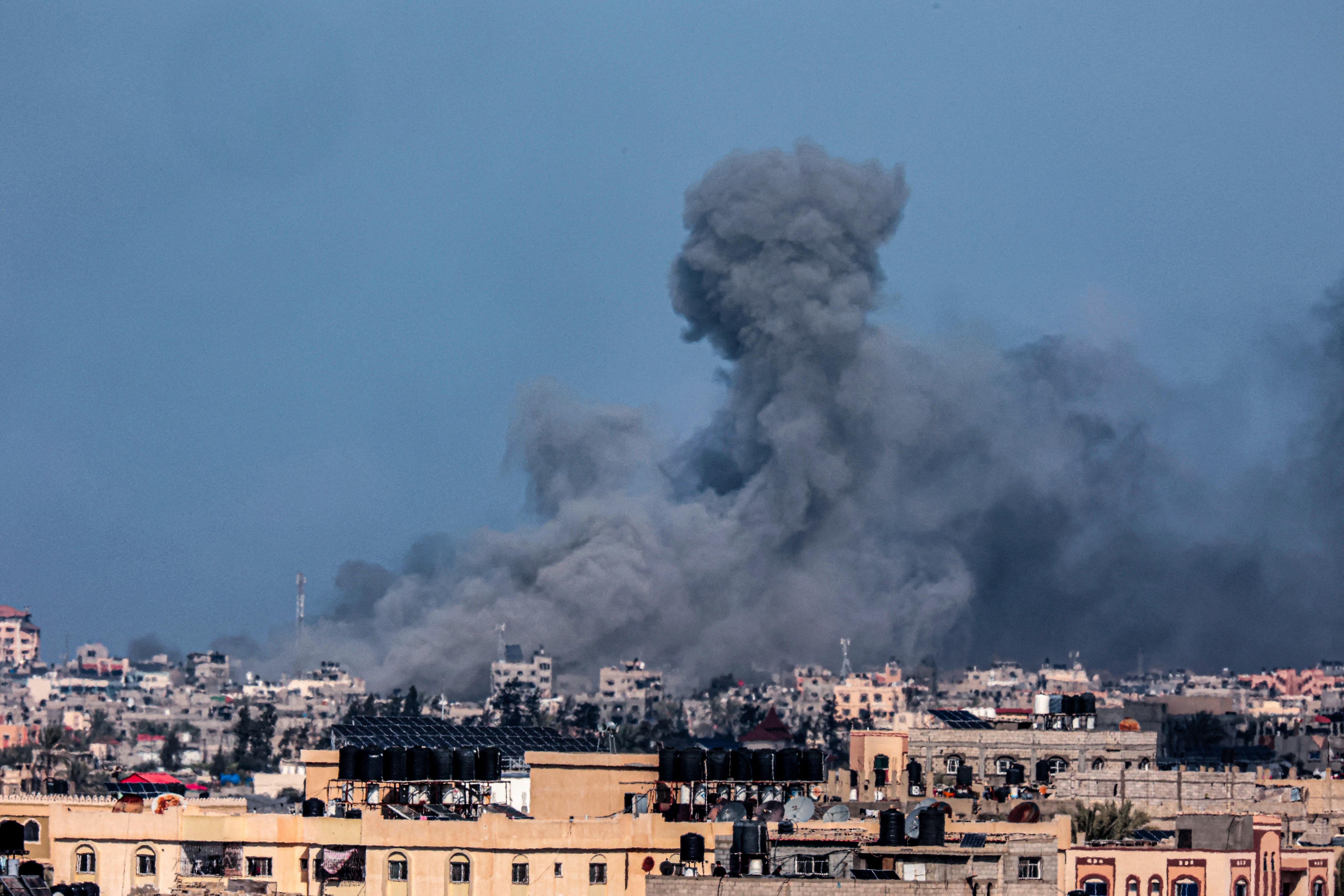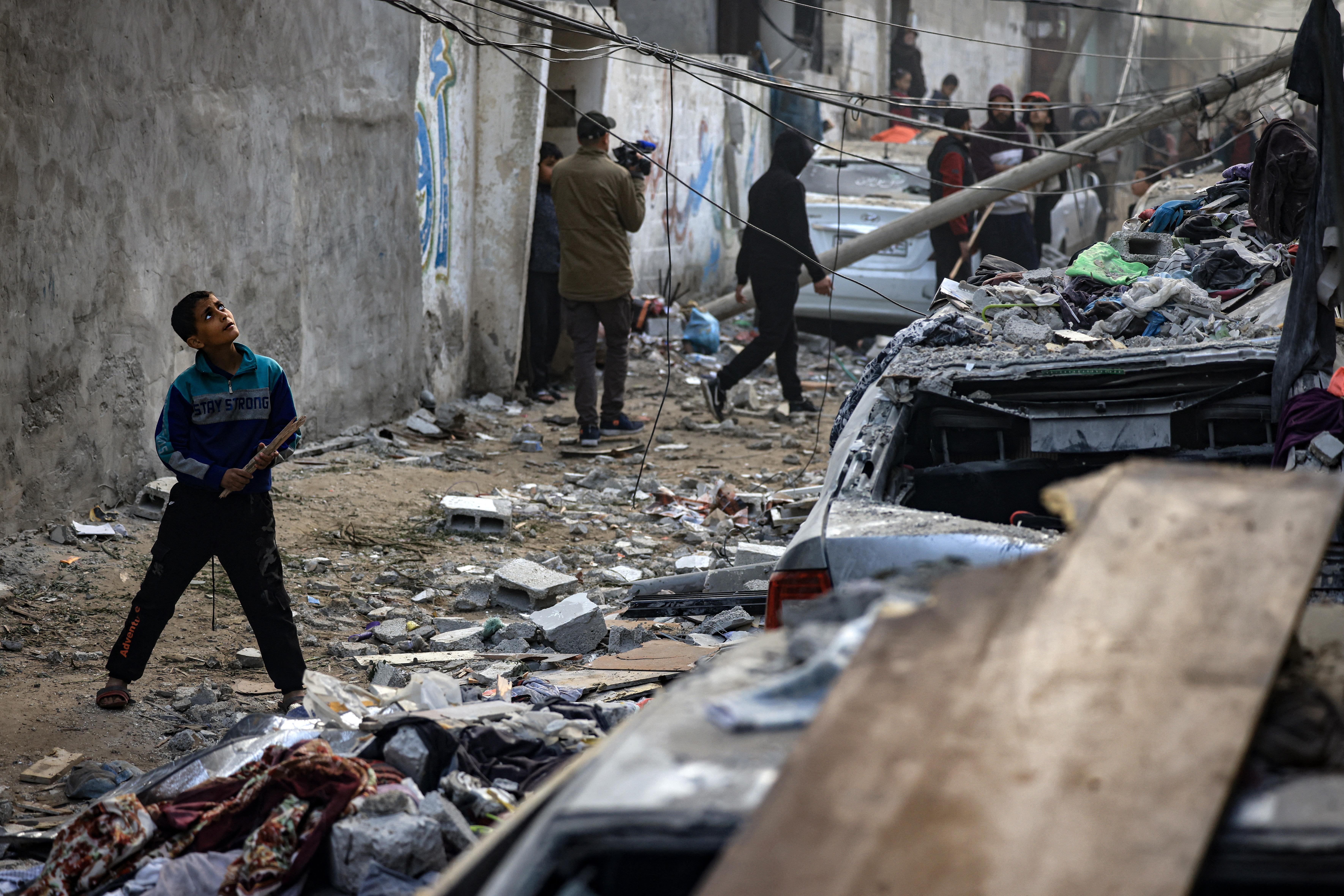 A picture taken from Rafah shows smoke billowing during Israeli bombardment over Khan Yunis in the southern Gaza Strip on Feb 9, 2024, amid continuing battles between Israel and the Palestinian militant group Hamas. (PHOTO / AFP)
A picture taken from Rafah shows smoke billowing during Israeli bombardment over Khan Yunis in the southern Gaza Strip on Feb 9, 2024, amid continuing battles between Israel and the Palestinian militant group Hamas. (PHOTO / AFP)
RAMALLAH / JERUSALEM / CAIRO / GAZA - The Palestinian Presidency on Friday condemned a statement by Israeli Prime Minister Benjamin Netanyahu regarding plans to start a military operation in the city of Rafah, south of the Gaza Strip.
Earlier, a statement issued by Netanyahu's Office said that the prime minister had ordered the army to prepare to evacuate Rafah and start a military operation to eliminate what remains of Hamas brigades.
"It is clear that a massive military operation in Rafah will force us to evacuate civilians from the combat area," said the statement from the Palestinian Presidency.
In its statement, Netanyahu's office said that the prime minister has ordered the army and the security establishment to submit to the cabinet "a combined plan for evacuating the (Gaza) population and destroying the (Hamas) battalions" in Rafah, which was previously considered a safe zone from Israel's relentless bombardments
The statement held the Israeli government and the US administration fully responsible for the consequences, emphasizing the danger of such destructive policies.
The Presidency affirmed that the Palestinian people "will not abandon their land and will not accept to be displaced from their homeland."
It called on the UN Security Council to assume its responsibilities because "the occupation's taking of this step threatens security and peace in the region and the world, and this exceeds all red lines."
ALSO READ: Netanyahu rejects Gaza cease-fire proposal
Since the start of the Israel-Hamas conflict in Gaza on Oct 7 last year, about half of the population of the sector has fled to Rafah, adjacent to Egypt, in search of a safe place.
The process of displacement of residents from their homes has increased recently after the Israeli army launched one of its largest and most massive attacks on Khan Younis, adjacent to Rafah, since weeks ago.
The border city, which receives food and medicine aid from foreign countries and UN agencies through the Rafah crossing, is crowded with tents spread in empty agricultural lands, schools, and along roadsides.
UN officials said that most of the new arrivals "live in temporary buildings, tents, or in the open air," pointing out that Rafah has now become a "pressure cooker of despair."
In its statement, Netanyahu's office said that the prime minister has ordered the army and the security establishment to submit to the cabinet "a combined plan for evacuating the (Gaza) population and destroying the (Hamas) battalions" in Rafah, which was previously considered a safe zone from Israel's relentless bombardments.
 People assess the damage caused by Israeli bombardment in Rafah in the southern Gaza Strip on February 9, 2024, as battles continue between Israel and the Palestinian Hamas movement. (PHOTO / AFP)
People assess the damage caused by Israeli bombardment in Rafah in the southern Gaza Strip on February 9, 2024, as battles continue between Israel and the Palestinian Hamas movement. (PHOTO / AFP)
He said a powerful ground operation is needed to "eliminate" Hamas militants who are still holed up in southern Gaza, but the population should be allowed to evacuate in advance.
"It is impossible to achieve the goal of the war without eliminating Hamas and by leaving four Hamas battalions in Rafah," he said, adding, "It is clear that intense activities in Rafah require the evacuation of civilians."
The remarks came after US President Joe Biden criticized Israel's retaliatory offensive in Gaza while warning of a high death toll among Palestinian civilians if Israeli ground troops push deeper into Rafah.
Earlier on Friday, Israel launched more deadly airstrikes on Gaza, killing 15 people, including eight in Rafah, according to the Gaza-based Health Ministry. The ministry said Friday that nearly 28,000 Palestinians have been killed since Israel launched the deadly military attacks in the enclave on Oct 7, 2023.
Meanwhile, the Egyptian presidency, in response to Biden's statement, said Friday that Egypt has opened the Rafah crossing to enable the flow of humanitarian aid into the Gaza Strip since "the first moment" of the Israel-Hamas conflict.
READ MORE: Israel resumes attacks in N. Gaza despite calls for ceasefire
"Egypt has mobilized massive humanitarian aid and relief from itself and other countries," the presidency said, adding that the persistent bombing of the Palestinian side of the crossing by Israel four times obstructed the aid delivery process.
On Thursday, speaking to reporters, Biden said, "Initially, the president of Mexico, Sisi, did not want to open the gate to (allow) humanitarian material to get in," mistakenly calling Egyptian President Abdel Fattah al-Sisi the leader of Mexico.
The United Nations Relief and Works Agency for Palestine Refugees in the Near East said that Israel has rejected half of the aid requests submitted by the agency for the northern Gaza Strip
"Egypt endured immense pressure and challenges to smooth the inflow and increase the amount of aid to Gaza," the statement underscored, adding that 80 percent of the aid provided to Gaza came from the Egyptian government, people, and civil societies.
The statement reiterated the Egyptian efforts to reach a ceasefire and protect the civilians.
The aid trucks first entered Gaza through the Rafah crossing on Oct 21, 2023, while wounded people and foreign passport holders have been entering the Egyptian side since the beginning of last November.
ALSO READ: Abbas urges UN to stop Israel from attacking Palestinians
Also on Friday, the United Nations Relief and Works Agency for Palestine Refugees in the Near East said that Israel has rejected half of the aid requests submitted by the agency for the northern Gaza Strip.
UNRWA Chief Philippe Lazzarini said in a statement that "since the beginning of the year, half of the aid requests we submitted to the north have been rejected."
The United Nations has identified deep areas of famine and hunger in the northern Gaza Strip, where people are believed to be on the brink of starvation, according to Lazzarini.
He mentioned that nearly 300,000 people in the north rely on the agency's aid to survive, noting that access to life-saving humanitarian aid is being blocked.
Flour and its derivatives, rice, and canned goods have been depleted amid the continued siege and prevention of food, water, and nutrition from entering by Israel, according to the Gaza-based government media office.
The office said in a statement that the residents of those areas were forced by the occupation to grind animal feed and grains instead of the missing wheat and are now facing real famine amid the ongoing aggression.



